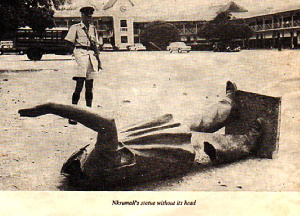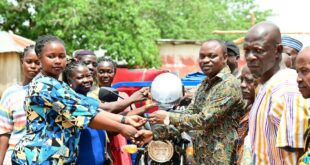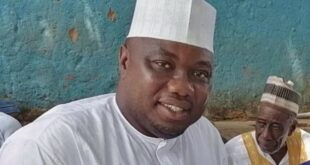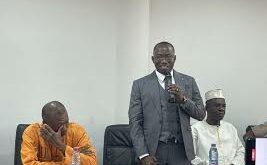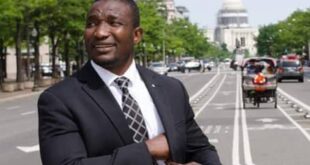It’s a day that will forever go down in memory! It was a good day for some and a bad one for others.
The first ever coup d’etat Ghana experienced took place on this day; February 24, 1966. And to make it even more historical, it was Ghana’s very first president, Osagyefo Dr. Kwame Nkrumah that was overthrown.
Dr. Nkrumah was not in the country while this took place, he was in Vietnam at the time, executing an assignment on behalf of Ghana.
Kwame Nkrumah was at the time in Hanoi, the capital of Vietnam, on a peacemaking trip over the Vietnam War, leaving a 3-person presidential commission in charge of the country.
Let’s take you back in history with what exactly happened on this day in 1966 in Ghana:
The coup d’état launched by the National Liberation council with the code name “Operation Cold Chop,” brought the country to a standstill.
Lt-Gen Emmanuel Kwasi Kotoka, was one of the leading members of the NLC who staged the coup.
“Fellow citizens of Ghana, I have come to inform you that the Military, in co-operation with the Ghana Police, have taken over the government of Ghana today. The myth surrounding Nkrumah has been broken. Parliament has been dissolved and Kwame Nkrumah has been dismissed from office. All ministers are also dismissed from office. The C.P.P. is disbanded with effect from now. It will be illegal for any person to belong to it,” Emmanuel Kwasi Kotoka announced the successful overthrow of Kwame Nkrumah on Radio Ghana.
Ahead of the coup, Nkrumah’s popularity had declined substantially, especially in mid-1961 when he instituted a wage freeze, tax increases, and a compulsory savings system to halt a serious drain on foreign exchange reserves without reducing development and prestige expenditures.
“That September, rail and dock workers, and some civil servants struck in protest, a demonstration unprecedented since the country’s independence. Some strikers demanded release of political prisoners and the holding of new elections, as well as satisfaction of their economic grievances.14 A week-long strike action was embarked upon by Ghanaian workers in the three main towns of Accra, Kumasi and Takoradi in protest against the government’s compulsory saving scheme and reflected the growing discontent of the Ghanaian public.
“Numerous assassination attempts traceable to outside intervention dotted Nkrumah’s years in power. In one instance, by unintentionally arriving a few minutes late for a dedication ceremony at Kulungugu, he avoided being killed by a time-bomb planted in a bouquet of flowers that had been given to a small child to present to him.
“The aftermath of this assassination attempt against Nkrumah in August 1962 at Kulungugu, a town he was visiting on the Upper Volta border, rekindled opposition at his center of power. In the following months, a series of bombing attacks in Accra killed at least 20 persons and injured nearly 400 more. The bombers and planners of the attempted assassination at Kulungugu are unknown but were probably part of a small terrorist group with little following. Their objective appears to have been the creation of civil disturbances which would force Nkrumah to step down,” portion of a document titled, ‘The United States and the Overthrow of Kwame Nkrumah,” from the Fort Hays State University, said.
Following the toppling of Kwame Nkrumah’s government, many people took to the streets in jubilation.
Kwame Nkrumah in his book, ‘Dark Days in Ghana’, wrote that the Central Intelligence Agency (C.I.A) of the United States of America aided the Ghana Army at the time to overthrow his government. He died on April 27, 1972, in Bucharest, Romania after being diagnosed with prostate cancer.
The Coup and its aftermath
Col. E.K. Kotoka, Major A.A. Afrifa and the then Inspector-General of Police, Mr. J.W.K. Harley staged the revolution at the dawn of February 24, 1966, while Nkrumah was still on a peace mission in Asia.
They had announced on the state radio that “Kwame Nkrumah is overthrown, and the myth surrounding him is broken.”
Apparently, Dr Nkrumah was seen as an ally of the then Soviet Union and Eastern Europe during the ‘Cold War’. But the pan-Africanist leader denied any of such accusations.
Several other charges levelled were on the grounds of introducing the Preventive Detection Act, corruption, dictatorial practices, oppression and lastly forcing into retirement the army’s most senior officers which according to the sources was the principal reason for the uprising
It was this action more than any other, according to then Major A. A. Afrifa, that led to the military-police coup which overthrew Nkrumah on February 24, 1966.
Nkrumah had welcomed the military coup that took place in Nigeria a few weeks before and had tried to strengthen the position of the more radical members of the military government that took power. Little did he realize how soon his own demise was to come at the hands of his own military?
The coup itself was welcomed in Ghana with far more enthusiasm than had been the case for independence. Only the Presidential Guard put up a brief resistance, and within 24 hours the coup was over. Nkrumah’s statue outside Parliament House, which proclaimed him the founder of the nation, was battered to the ground and smashed into pieces.
Following the night after the coup, there were demonstrations of support for the new rulers, who styled themselves the National Liberation Council (NLC). Even members of the 74-man delegation that had accompanied Nkrumah to China at a time the coup happened deserted their former leader.
Foreign Minister Quaison-Sackey, who Nkrumah had sent to protest the seating of the new Ghanaian government’s mission at the OAU meeting in Addis Ababa, flew instead to Accra, where he pledged his loyalty to the new military government.
The prisons emptied of Nkrumah’s detainees and began to fill with new political prisoners. The CPP, with its 2-million strong membership and 500,000 militants, offered no resistance, and the party allowed itself to be disbanded by a single radio announcement.
As for Nkrumah, his friend and sometimes rival President Sekou Toure offered him refuge and made him the honorary co-president of Guinea.
He was to spend five years in his new home engaged in writing projects and cultivating roses while waiting for the people of Ghana to call him back. Eventually, stricken with cancer, he was flown to a clinic in Bucharest, where he died on April 27, 1972.
To a larger extent, Nkrumah’s ‘violent’ removal from office, unfortunately, brought Ghana in line with what was emerging as the trend in Africa. That is the military intervention into politics.
 Home Of Ghana News Ghana News, Entertainment And More
Home Of Ghana News Ghana News, Entertainment And More
